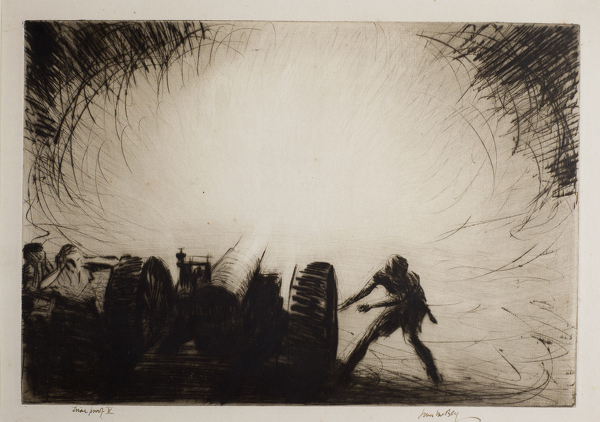This drypoint was issued in an edition of 76 with 7 Trial proofs, of which this is no 5.
Zero is listed as catalogue number 201 in Hardie's, James McBey Catalogue Raisonne, 1902 - 1924, (London, 1925) where is is described as follows:
One of the guns near Jelil is opening fire at the 'zero' hour before dawn in the surprise bombardment on the morning of September 19th, 1918. The gun is in the foreground to left, silhouetted against the flash of light. On the extreme left are two men, one of whom holds his hand to his ears.
According to Michael Campbell:
Zero is the most dramatic of all of James McBey’s great wartime prints. The image shows one of the guns near Jelil opening fire at the ‘zero’ hour before dawn in the surprise bombardment on the morning of September 19th, 1918. Martin Hardie considered this to be “the outstanding plate” of the Second Palestine Set.
James McBey had accompanied the Australian Camel Patrol, as an Official War Artist, from the Suez Canal across the Desert of Sinai during the desert war campaign of 1917-18. He had witnessed the surrender of Jerusalem to the allied forces and by the date of this image was with the troops of the 7th Division advancing upon the Turkish positions at Jelil. This brilliant drypoint, like all of James McBey’s wartime prints, was worked up from on-the-spot sketches after the war was over.
At the time of their release, James McBey’s desert war etchings were considered to be the greatest of all of his works, a single impression of his etching Dawn, The Camel Patrol Setting Out, realising the highest price ever attained for a living etcher’s work in this country when it sold for £440 at auction in the late 1920’s. Zero eclipses even that great work in its stunning immediacy and dramatic realism.
We are grateful to Michael Campbell for assistance.

